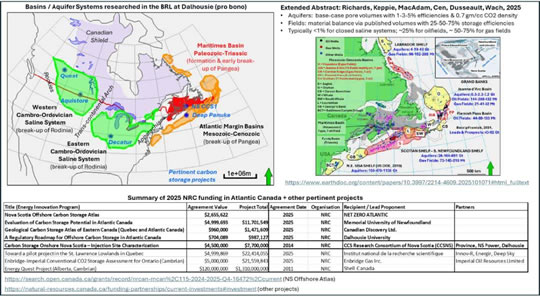EES Departmental Seminar: Bill Richards & Grant Wach
Bill Richards, Grant Wach, Fraser Keppie, Helen Cen and Natasha MacAdam
Basin & Reservoir Lab, EES, Ģ��AV U
Title: Geological Carbon Storage (GCS) in Atlantic Canada

Abstract: The objective of this talk is to provide an update on Geological Carbon Storage (GCS) in Canada, technical activity in the Basin and Reservoir Lab at Ģ��AV since 2019, and four ongoing federally funded research projects in Atlantic Canada (started in 2025). We will discuss storage in sedimentary basins across Canada and the USA: from Alberta to Quebec (Cambro-Ordovician Saline Systems - world-class aquifers with three operational facilities), the Maritimes Basin (Paleozoic and Triassic systems - limited potential and high risk), and Atlantic Margin Basins from the Baltimore Canyon Basin to Northern Labrador (Mesozoic and possibly Cenozoic systems - world-class aquifers & technically proven at Deep Panuke field, but lacking regulations).
Key topics are as follows. (1) structural-stratigraphic architecture and hydrodynamic settings which underly the play elements of "pore space", “injectivity”, “trap / seal” (structural-stratigraphic trapping in depleted hydrocarbon fields, capillary trapping in monoclinal aquifers) and “pressure space". (2) Storage resource assessments based on static modeling of pore space, material balance, dynamic modeling of plume migration and pressure, and ranges of storage efficiency factors. (3) Resource classification (SPE Storage Resource Management System, UN Framework Classification, OGCI Storage Resource Catalogue). (4) Risking of resources (play elements & risk-adequacy matrices). (5) Operational integrity.
Our technical projects over the last 6 years reflect considerable discussion at EAGE conferences with academic and industry experts (Equinor, Shell, Total and BP). We will present material from our two most recent EAGE talks: a quantitative assessment of Atlantic Margin Basins (annual conference, June 2025) and assessment of storage in Cambro-Ordovician systems from global scale to operational scale in Ontario. This second talk (October 2025) was the wrap-up presentation for EAGE's annual student energy transition competition ("Minus CO2 Challenge"). It comprised one of four Nova Scotia datasets we provided for EAGE energy transition competitions and concludes with an example of full-cycle project planning: gesoscience-engineering-economic modeling-SHE-MMV. The technology of CCS is well-established with 392 ongoing projects. Our biggest hurdles in Atlantic Canada are lack of regulations and cost of carbon capture.
Time
Location
Milligan Room, B-8007 8th Floor Biology/EES wing of the LSC
Additional Information
Meet the lecturer: FREE COFFEE and COOKIES in B-3078 at 10:45 am before the lecture
